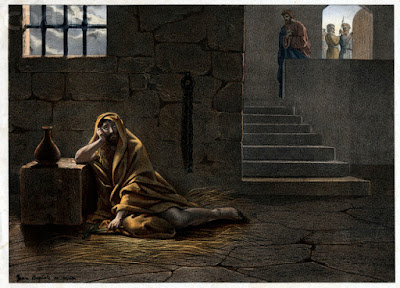THE REVOLUTION OF JOY.
December 15 2019: Third Sunday of Advent (Gaudete) - A
A Dutch proverb says, “It's a poor heart that never
rejoices.”
“Rejoice in the Lord
always; again I say, rejoice. Indeed, the Lord is near.” From that beautiful
antiphon said in Latin words, this third Sunday of Advent has its calling, “Gaudete”
or Sunday of Joy. Through today’s liturgy, we learn that Christian life is a
life of joy, a revolution of joy. Actually, the coming of the Lord will bring
about a great revolution. The whole creation will feel and exult at his
presence. Those who were lamenting or living in the valleys of tears and darkness
will see a new light. Everything that kept mankind in sorrow, and slavery will
be destroyed, even the greatest human infertility, sin, will be smashed. So will
the joy of the redeemed people will be great and blissful. That day long awaited
is at hand. We already have sight of it. Externally, we just need to look
around in our surrounding, all speaks of Christmas. We feel the magic of this
season everywhere: decorations are already set, the Belen are being built, and
even the nature communicates of the imminence of the season, cool or cold
weather. Christmas is really at hand. So, rejoice!
The word of God for our today’s celebration will not be a
cacophony or a wrong note in that melody of joy. In the first reading, the
Prophet Isaiah announces to the people of Israel the sight and signs of that
coming joy. “The desert and the parched land will exult; the steppe will rejoice
and bloom. They will bloom with abundant flowers, and rejoice with joyful song.”
Many, indeed, are the signs which will follow and testify of
the coming and the presence of the Lord and give more reason to rejoice. Among
them, Isaiah says, “…The eyes of the blind be opened, the ears of the deaf be
cleared; then will the lame leap like a stag, then the tongue of the mute will
sing.”
This is actually a real revolution which will take place. Because,
even the whole creation will sing with elation. Let us just imagine a desert
covered with flowers in abundance. The waterless land becoming productive, that
is nothing less than a revolution. This is actually what will happen, Isaiah
says, with the coming of the Lord. And that won’t take long before happening.
Seeing the proximity of that event, James in the second
reading exhort us to be patient. Often, when you prepare yourself for something
and it seems delaying or taking a little longer than expected, the temptation
is to fall in despair and lose patience. The Apostle James exhorts the Lord’s followers
who, in front of difficulties and trials were losing hope of his coming, “Be
patience… Make your hearts firm, because the coming of the Lord is at hand.” This
exhortation is also addressed to you and me. And not only that we need patience
and courage, waiting for the Lord’s coming, James adds, “Do not complain,
brothers and sisters, about one another, that you may not be judged.” We have
not to complain or murmur, but instead, live in good harmony and be filled with
joy. Patience pays. The farmers have great lessons to give about patience. By waiting
patiently and still working, a farmer harvests the fruits of his labor. The farmer
who has no patience abandons his field in the bush and loses everything, all
his efforts turn into vain. Signs of the coming of the Lord are plenty today. We
just need to open our eyes and see them and therefore, rejoice.
In the gospel, we hear off John the Baptist. He is the “immediate
precursor or forerunner, sent to prepare his way” CCC. 523. There is however, a
certain irony in the gospel. John, we know, came to prepare the way of the
Lord. He preached in the desert as we heard last Sunday, inviting people to
repent and turn away from sin, because the day of the Lord was at hand. The irony
here is that, while in prison, John seems questioning himself about the Messiah
he preached and the messianic time. Thus, his question through messengers to
Jesus, “Are you the one who is to come, or should we look for another?”
This question, actually, translates not only the feeling of
John alone, but the expectation of the whole people of Israel. The people, and
John includes, where expecting a political and powerful Messiah who will come
to overthrow the Roman Empire and restore a Davidic kingship. With Jesus,
however, they are faced with a kind of deception. Instead of political fighter,
they have a servant and compassionate leader, one who walks their streets
preaching the good news, healing the blind, the deaf, the lame, the leper,
raising up the dead and comforting the afflicted and the poor; a too much
compassionate teacher. That sounds disconcerting and puzzling. Hence, the
question of John, “Are you the one who is to come, or should we look for
another?”
Jesus, however takes them back to the prophetic message of Isaiah.
God is coming not to fight man and destroy him, but to bring him joy and
release him from the real power which enslaves him. He comes to make himself
close to mankind so than humanity should get close to God. This sounds a
beautiful lesson to all those in position of authority and to our today’s
leaders. It is a call to service and becoming servant of the poor. Christmas,
or the coming of the Lord is an exhortation to reorient our perspectives and
accept like Jesus, to make the difference, bringing joy to those who need it
the more. The real joy is not what one gets for himself, rather, what one gives
to others.





Comments
Post a Comment